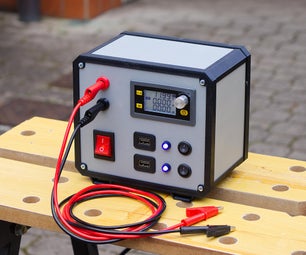Introduction: Pocket 10 Watt Amplifier
OK , Hi all ..
This my First Project in Instructables ^_^
I am from Indonesia , Here was held 26th SEA Games 2011... GO Indonesia !!!
=============================================================
Ok check this out ,
This is 10 watt amplifier and LoudSpeaker,
Let me tell you how I make this thing
Part List :
# acrylic
# Loudspeaker
# PCB
# Some Wire
# 9Volt battery Connection
# Unbalance Jack Female
# Power Jack Female
# Potensiometer
# Capacitor ( 2.2uF ; 470uF ; 100uF ; 0.1uF ; 1000uF )
# Resistor ( 220R ; 2.2R ; 1R )
# IC Tda2003
# Heatsink
Step 1: Build Loudspeaker Box
Tools I use :
# Saw
# Drill machine
# Melting Glue
I think the result is not bad ,
...
...
...
Ok its bad but not really , LOL
Step 2: Core Part - Tda2003
The TDA2003 is a cheap amplifier that is designed to run on single rail power supplies. It has many applications (including in car systems if you do not need to show off down the high street with your subwoofers!) and is protected against short circuits in almost every way you would think them possible.
Step 3: The Circuit
This amplifier is based on the typical application in the ST Microelectronics datasheet. The performance from this circuit is very satisfactory. The sheet contains data for typical noise and distortion statistics, I cannot confirm these statistics because I don't have the equipment, but my ears tell me that the sound is good and with sensitive speakers, this amp will show some power.
Resistor are recommended as 1% metal film, but as the picture of my prototype shows below, 5% resistors are capable (the cream coloured ones), except for the critical Rx resistor, which should be 1%. R2 and R3 are low value resistors and (unlike me) you should try and get close tolerance resistors for these. Capacitors should be electrolytic above 1uF and rated at 25V minimum. They must all be connected the right way round or failure and possibly injury will follow when the amp is powered up.
Rx and Cx must be worked out using the data sheets mathematical calculations. If in doubt however, I used 39 ohm for Rx and 33nF for Cx. Other non-electrolytic capacitors can be any type available. I used polyester layer capacitors because they have a closer tolerance (i.e. 5%) than most other capacitors.
A heatsink is important. The one shown in my prototype is actually too small and you should obtain something bigger for improved operation (unless your working with small voltages).
source : http://www.e-dan.co.uk/electronics/TDA2003.html
Here is the Design and Layout I use
http://www.ziddu.com/download/17590310/10wattamplifier.rar.html
Step 4: Build the Circuit Part I
tools I use :
# Acetone
# saw
# FeritCloride
# mini drill
For the Layout :
I think you can make better than me according to your needs ^_^
but if necessary I will upload it
Step 5: Build the Circuit Part II
Place all components on the circuit
Tools I use :
# Solder Iron
# Tin
# Helping Hand Soldering ( I make this myself )
# Melting Glue
Step 6: Place Whole Circuit to Box
Hole on the box for :
# for Loudspeaker (output)
# for 9 Volt Battery (input)
# for Unbalance Jack Audio (Input)
# for Potensiometer (volume control)
# for 12 Volt from Power Jack (input)
Tools I use :
# saw
# Melting Glue
# Drill Machine
Step 7: Finally Done ^_^
okay just stay together all parts !!!
this amplifier use two way power :
1. 9volt connection for 9volt baterry ( low Quality Output )
2. Power Jack for 12 volt - 18 volt input ( for better Quality Output )
OK , hopefully this can inspire you
Thank You

Runner Up in the
Pocket-Sized Contest













